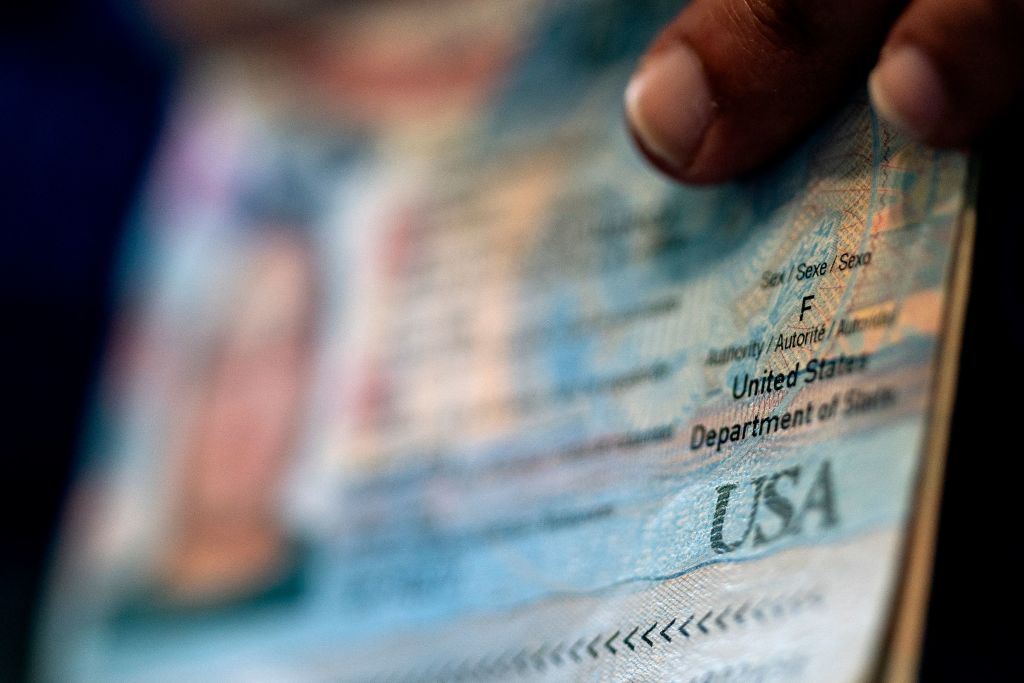Transgender Americans ask Supreme Court to leave order in place allowing them to choose sex markers on passports


Lawyers for a group of transgender and nonbinary Americans urged the Supreme Court on Monday afternoon to leave in place a mandate by a federal judge in Massachusetts that temporarily requires the State Department to provide them with passports reflecting the sex designation of their choice. A policy implemented by the Trump administration that “classif[ies] people based on sex assigned at birth and exclusively issu[es] sex markers on passports based on that sex classification,” wrote attorney Chase Strangio, “puts transgender, nonbinary, and intersex people in potential danger whenever they use a passport.”
At issue in the case is a group of orders by U.S. District Judge Julia Kobick that bars the federal government from implementing an executive order issued by President Donald Trump on Jan. 20. The order, titled “Defending Women from Gender Ideology Extremism and Restoring Biological Truth to the Federal Government,” was a reversal from a policy put into place under the Biden administration, which had allowed transgender people to obtain passports that reflected their gender identity without providing any medical documentation and added a third gender marker – “X” – for nonbinary applicants.
Trump indicated that, going forward, the federal government would only “recognize two sexes, male and female.” “‘Sex,’” Trump’s order said, “shall refer to an individual’s immutable biological classification as either male or female” and “does not include the concept of ‘gender identity.’” Trump’s order also directed the State Department to “require that government-issued identification documents, including passports, visas, and Global Entry cards, accurately reflect the holder’s sex.”
The seven individual plaintiffs in this case, who are transgender and nonbinary, went to federal court to challenge Trump’s order. They contended that the new passport policy violated their rights to equal treatment under the Constitution, as well as their rights to international travel and informational privacy. The policy also violated the federal law governing administrative agencies, they said.
On April 18, Kobick issued an order that temporarily blocked the federal government from enforcing the new passport policy against six of the seven individual plaintiffs while the litigation continued. (The seventh plaintiff already has a passport with a gender marker consistent with his gender identity that will not expire until 2028, so Kobick concluded that he would not be permanently harmed if the policy remained in place while litigation moved forward.)
Just under two months later, Kobick issued a new preliminary order that prohibited the federal government from enforcing the passport policy against a broader class of transgender and nonbinary people who have applied or would apply for a passport consistent with their gender identity.
After the U.S. Court of Appeals for the 1st Circuit refused the Trump administration’s request to put Kobick’s orders on hold, U.S. Solicitor D. John Sauer came to the Supreme Court, asking the justices to intervene. Sauer told the court that the passport policy was “eminently lawful.” He contended that Kobick’s ruling “injures the United States by compelling it to speak to foreign governments in contravention of both the President’s foreign policy and scientific reality.”
Strangio pushed back against the Trump administration’s invocation of foreign relations to justify the passport policy. Among other things, he suggested, federal courts do have the power to rule on questions related to passports. And in any event, he continued, “the government has never explained how passport sex markers that align with gender identity, including the sex the person lives as and outwardly expresses, could possibly affect foreign relations—when the challenged policy undermines the very purpose of passports as identity documents that officials check against the bearer’s appearance.”
Moreover, Strangio continued, the passport policy violates the federal law governing administrative agencies because it was neither “reasonable” nor “reasonably explained” – the criteria for actions by an agency to pass muster. In putting the passport policy into place, Strangio argued, the State Department moved very quickly and did not “explain why it was abruptly changing course from years of prior policy,” under which the challengers would have been able to obtain passports that matched their gender identities. Nor did it “address the reliance” on the previous policy by those “affected by its sudden reversal.”
Finally, Strangio wrote, the passport policy was “likely motivated by impermissible animus against transgender people.” He noted that “the government admitted below that a ‘core’ purpose of the Passport Policy is ‘outing’ transgender people.”
Posted in Court News, Emergency appeals and applications
Cases: Trump v. Orr